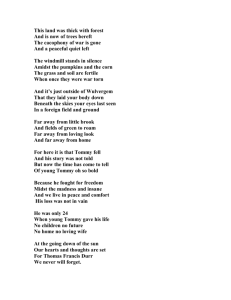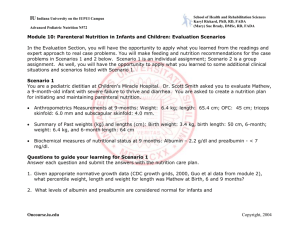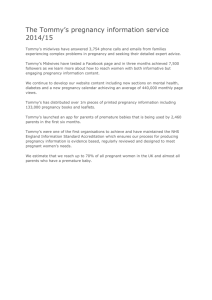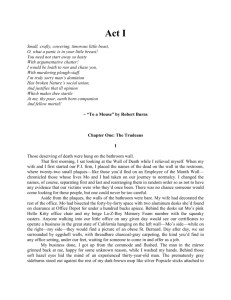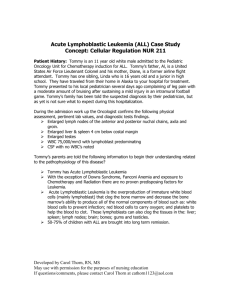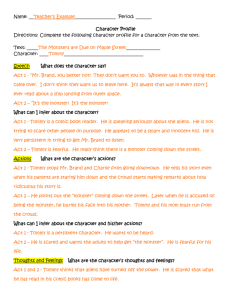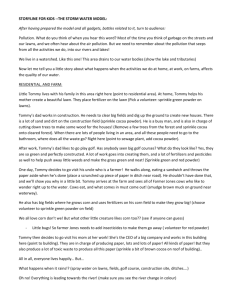Scenario 1
advertisement
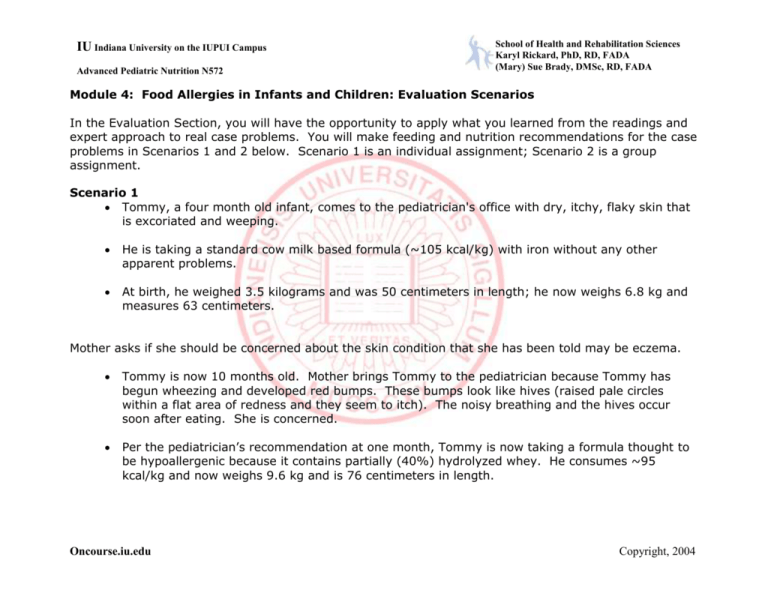
IU Indiana University on the IUPUI Campus Advanced Pediatric Nutrition N572 School of Health and Rehabilitation Sciences Karyl Rickard, PhD, RD, FADA (Mary) Sue Brady, DMSc, RD, FADA Module 4: Food Allergies in Infants and Children: Evaluation Scenarios In the Evaluation Section, you will have the opportunity to apply what you learned from the readings and expert approach to real case problems. You will make feeding and nutrition recommendations for the case problems in Scenarios 1 and 2 below. Scenario 1 is an individual assignment; Scenario 2 is a group assignment. Scenario 1 Tommy, a four month old infant, comes to the pediatrician's office with dry, itchy, flaky skin that is excoriated and weeping. He is taking a standard cow milk based formula (~105 kcal/kg) with iron without any other apparent problems. At birth, he weighed 3.5 kilograms and was 50 centimeters in length; he now weighs 6.8 kg and measures 63 centimeters. Mother asks if she should be concerned about the skin condition that she has been told may be eczema. Tommy is now 10 months old. Mother brings Tommy to the pediatrician because Tommy has begun wheezing and developed red bumps. These bumps look like hives (raised pale circles within a flat area of redness and they seem to itch). The noisy breathing and the hives occur soon after eating. She is concerned. Per the pediatrician’s recommendation at one month, Tommy is now taking a formula thought to be hypoallergenic because it contains partially (40%) hydrolyzed whey. He consumes ~95 kcal/kg and now weighs 9.6 kg and is 76 centimeters in length. Oncourse.iu.edu Copyright, 2004 IU Indiana University on the IUPUI Campus Advanced Pediatric Nutrition N572 School of Health and Rehabilitation Sciences Karyl Rickard, PhD, RD, FADA (Mary) Sue Brady, DMSc, RD, FADA Questions to guide your learning Answer each question and submit the answers with the nutrition care plan. What other information do you need to know? How is this baby growing? What is the diagnosis? What would you recommend? Explain your rationale. Tommy is now 10 months old. Mother brings Tommy to the pediatrician because Tommy has begun wheezing and developed red bumps. These bumps look like hives (raised pale circles within a flat area of redness and they seem to itch). The noisy breathing and the hives occur soon after eating. She is concerned. Per the pediatrician's recommendation at one month, Tommy is now taking a formula thought to be hypoallergenic because it contains partially (40%) hydrolyzed whey. He consumes ~95 kcal/kg and now weighs 9 kilograms and is 70 centimeters in length. Questions to guide your learning Answer each question and submit the answers with the nutrition care plan. What does this information tell you related to a diagnosis? How is this baby growing? What other information do you need to know? What would you recommend? Explain your rationale. Oncourse.iu.edu Copyright, 2004 IU Indiana University on the IUPUI Campus Advanced Pediatric Nutrition N572 School of Health and Rehabilitation Sciences Karyl Rickard, PhD, RD, FADA (Mary) Sue Brady, DMSc, RD, FADA Two years later this mother becomes pregnant. She would like to know what to feed this baby (through the first year of life). What would you recommend? Explain your rationale. After you complete the answers and the nutrition care plan, you will put them into your Drop Box located on the left menu bar in Oncourse. Upload your document into the drop box and then proceed on to the next scenario. Title the document with your last name, course #, module # and title and date (e.g., Brown_N572_mod 4_FoodAllergies101507). Oncourse.iu.edu Copyright, 2004
